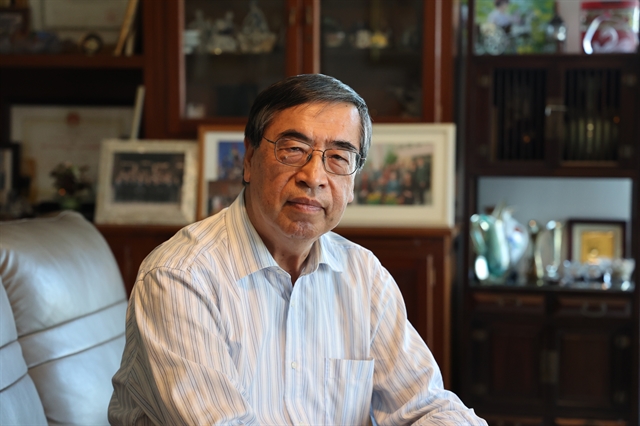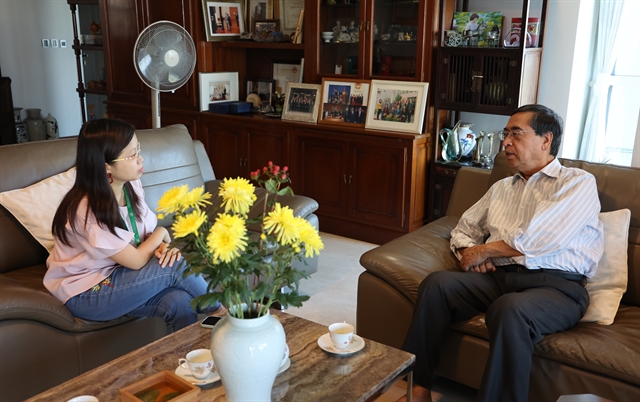Viet Nam News reporter Thu Ha talks with former Deputy Minister of Foreign Affairs Nguyen Phu Binh, who served as the first Vietnamese Ambassador to South Korea. Binh is also chairman of the Association for Liason with Overseas Vietnamese.

Thirty years after establishing diplomatic relations, the relationship between Viet Nam and the Republic of Korea is at its best ever. From "former enemies" during the war, the two countries have come a long way to become close friends and important partners. Viet Nam News reporter Thu Ha talks with former Deputy Minister of Foreign Affairs Nguyen Phu Binh, who served as the first Vietnamese Ambassador to South Korea. Binh is also chairman of the Association for Liason with Overseas Vietnamese.
Can you tell us about the very first days you came to the Republic of Korea as the first Vietnamese Ambassador of a unified Viet Nam?
I studied in North Korea from 1965 to 1970. In 1989, when I was the Chief of Staff of the Ministry of Foreign Affairs, I had the opportunity to attend an event in South Korea. At that time, I could feel that the Korean people had a strong desire to develop their countries to be on par with other big powers. But South Korea had sent troops to fight against us during the war, so this was one of the barriers hindering bilateral relations, which remains a problem even to date. However, when I met South Korean officials, they were very friendly to me and expressed their wish that one day the two countries could develop normal relations. Then in 1992, when the two countries started to establish diplomatic relations, I was sent to South Korea initially as head of the liaison office. At first, the relations were not at the ambassadorial level yet.
Then, South Korea implemented the "Northern Policy", which aimed to reach out to the communist countries while we were carrying out the policies of Doi Moi (Renewal) and international integration. So the two sides met each other at that point. They needed us, and we needed them. Although we started with only a liaison office, the South Korean side had confirmed behind doors that they were ready to establish full diplomatic relations as soon as possible. As a result, it took only another eight months for the two countries to establish relations at the ambassadorial level. I still remember there were only a handful of Vietnamese people living in South Korea at that time. They were Vietnamese women married to Korean military officers and came to the country with their husbands before 1975. On the opening day of the Vietnamese Embassy in December 1992, some met me and cried. They told me that since coming there, it was the first time they felt like they were seeing their own family again.
Back then, did you ever imagine that there would be a day like today? Can we call the bilateral relations' rapid and comprehensive development a "miracle"?
It is indeed a miracle. And this is not just an assessment from the Vietnamese side but also the South Korean. When I arrived 30 years ago, I sent a report back home saying the potential for the bilateral relationship was very good. Many colleagues told me that I was way too optimistic. But now, looking back, the bilateral relations have developed even much more than I expected. It is already a blessing to turn from enemies to establishing a relationship with each other. But in reality, it can be said that there has never been a relationship which has developed so quickly. In 2001, the "Comprehensive Partnership for the 21st Century" was established. In 2009, the relationship was upgraded to a "Strategic Cooperation Partnership". It is expected that this year, on the 30th anniversary of the establishment of diplomatic relations, the relationship will be upgraded to a "Comprehensive Strategic Partnership".

Economic cooperation, especially investment, has always been the brightest spot and an important pillar in bilateral relations. How do you see the role of investment capital of South Korean enterprises in the economic development of Viet Nam?
When we first established diplomatic relations, we aimed to break the siege of economic isolation and speed up the country's international integration process. At that time, the then Deputy Minister of Foreign Affairs Vu Khoan told me to entice South Korean small and medium enterprises to come to Viet Nam. He feared that large corporations would not be interested in doing business with us. But it turned out very different. Only days after I came to South Korea, leaders of big corporations came to see me. I was invited by the chairman of Samsung, the father of the current Samsung chairman, to his house for dinner. I also had a close relationship with the LG chairman.
South Korea has always been one of the largest investors in Viet Nam, often the most. South Korea's investment in Viet Nam is very diverse, from labour-intensive fields such as footwear and textile production to high-tech fields such as electronic components production. In the past, South Korean investment was mainly focused on the sectors in that South Korea faces difficulties, which are those requiring a lot of labour. Their investment is also aimed at our market with 100 million people, which is seen as a relatively large market for South Korea. But now we can see that high-tech fields that require highly skilled human resources are also attracting a great deal of investment in Viet Nam.
What factors contributed to this success?
First, Viet Nam and South Korea have many factors that complement each other. What we need is what they have, and vice versa. For example, South Korea is poor in natural resources, while they are abundant in Viet Nam. South Korea has capital and development experience, while Viet Nam has a population of 100 million people, a big market with abundant human resources that South Korea lacks. The two countries also shared many similarities in history and culture. Another very important factor is the stable political situation in Viet Nam which puts South Korean investors at ease when doing business in our country. Viet Nam is also promoting international economic integration. We have signed many free trade agreements that benefit South Korean businesses here. Besides, Viet Nam is located in a favourable geographical position in the middle of a crucial sea traffic route. This helps South Korean businesses as they can easily ship their goods anywhere.
Do you see any factors that may hinder bilateral relations?
I wouldn't call them a hindrance, but rather factors that need to be considered. One is the issue of the past. However, I think both sides are aware of the importance of nurturing bilateral relations, so there will be no such tensions involving historical factors like those in Japan-China or Japan-South Korea relations. Another factor is the situation on the Korean Peninsula. But so far, Viet Nam has always expressed its support for peace, stability, dialogue and denuclearisation of the Korean Peninsula. I think the situation on the Korean Peninsula may be tense sometimes, but it will not develop into a hot war. So this is also a factor to consider, but the risk is not high.
What are the fields that have great potential for further development?
There are many areas that can be further developed. For example, cooperation in science-technology and education has been very good recently. The potential for cooperation in military and defence is also huge. The two sides have already had some exchanges in this field. Still, in the near future, the cooperation may become more extensive. In addition, exporting agricultural produce offers great potential in trade because South Koreans love the tropical fruits that Viet Nam has. Viet Nam can attract more South Korean enterprises to do agricultural business in Viet Nam, from planting and processing to trading. VNS





